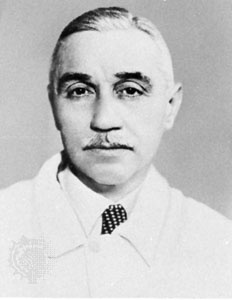Bordet, Jules
Belgian bacteriologist
in full Jules-Jean-Baptiste-Vincent Bordet
born June 13, 1870, Soignies, Belg.
died April 6, 1961, Brussels
 Belgian physician, bacteriologist, and immunologist who received the Nobel Prize for Physiology or Medicine in 1919 for his discovery of factors in blood serum (serum) that destroy bacteria; this work was vital to the diagnosis and treatment of many dangerous contagious diseases.
Belgian physician, bacteriologist, and immunologist who received the Nobel Prize for Physiology or Medicine in 1919 for his discovery of factors in blood serum (serum) that destroy bacteria; this work was vital to the diagnosis and treatment of many dangerous contagious diseases.Bordet's research on the destruction of bacteria and red corpuscles in blood serum, conducted at the Pasteur Institute, Paris (1894–1901), contributed significantly to the foundation of serology, the study of immune reactions in body fluids. In 1895 he found that two components of blood serum are responsible for the rupture of bacterial cell walls (bacteriolysis): one is a heat-stable antibody found only in animals already immune to the bacterium; the other is a heat-sensitive substance found in all animals and was named alexin (it is now called complement). Three years later Bordet discovered that red blood cells from one animal species that are injected into another species are destroyed through a process ( hemolysis) analogous to bacteriolysis.
In Brussels, where Bordet founded and directed (1901–40) what is now the Pasteur Institute of Brussels, he continued his immunity research with Octave Gengou, his brother-in-law. Their work led to the development of the complement-fixation test, a diagnostic technique that was used to detect the presence of infectious agents in the blood, including those that cause typhoid (typhoid fever), tuberculosis, and, most notably, syphilis (the Wassermann test). After discovering (with Gengou in 1906) the bacterium, now known as Bordetella pertussis, that is responsible for whooping cough, Bordet became professor of bacteriology at the Free University of Brussels (1907–35).
- magnetic force
- Magnetic Island
- magnetic mirror
- magnetic monopole
- magnetic permeability
- magnetic pole
- magnetic recording
- magnetic resonance
- magnetic resonance imaging
- magnetic resonance spectroscopy
- magnetic Reynolds number
- magnetic storm
- magnetic survey
- magnetic susceptibility
- magnetism
- magnetite
- magneto
- magnetoencephalography
- magnetohydrodynamic power generator
- magnetohydrodynamics
- magnetometer
- magneton
- magnetosphere
- magnetostriction
- magnetron